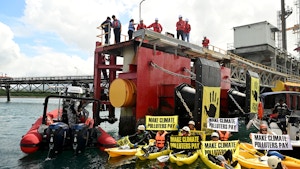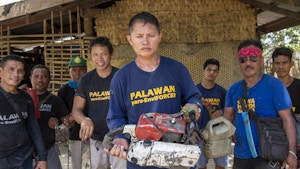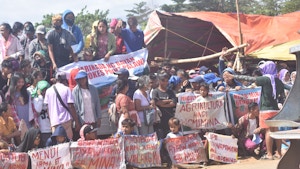Philippines News

Carbon & Climate
Seeing mangroves regrow: A visual story on the surprise resurgence of Iloilo’s coastal forests
On International Day for the Conservation of the Mangrove Ecosystem, Eco-Business looks at the unexpected rapid growth of a thriving mangrove forest in Iloilo City, Philippines, following the completion of a man-made floodway.

Policy & Finance
Philippine president pushes lawmakers to pass law to legitimise country as loss and damage fund host
In his third state of the nation address, Philippine president Ferdinand Marcos, Jr urged lawmakers to enact an enabling law for the climate fund, but advocates lament lack of climate justice among his priorities.

A look at Southeast Asia's evolving landscape of solar energy adoption, from achievements to hurdles and future aspirations.

Policy & Finance
Sabah’s labour law reform signals closer alignment with global standards, but child exploitation still a concern
A new bill aims to update Sabah's labour law and align Malaysia with international standards. It introduces provisions on child labour and improved protections. However, activists stress that educating workers on their rights is crucial.
Policy & Finance
Philippines to host 'loss and damage' fund board
Philippines Opinion

Bullish gas plans ignore the financial challenges of infrastructure development, renewable energy potential in the region and climate policy restrictions.

For Southeast Asia, it need not be a binary choice between maintaining status quo or pushing for 'degrowth'. Reducing emissions without neglecting job growth imposes lower social costs, and can be a pathway to take for the region.

Carbon & Climate
Could the low-carbon economy bill re-write the Philippines’ future?
House Bill 7705, the low carbon economy bill, could help the climate-vulnerable nation seize the economic opportunities that come with decarbonisation.

Carbon & Climate
Strengthening Asia’s voice for sustainable development
Eco-Business has launched new subscription plans for our community. We invite you to support our independent journalism and thought leadership initiatives to forge a sustainable Asia and beyond.
Policy & Finance
Is Southeast Asia's healthcare workforce ready for climate change?
Philippines Videos

Carbon & Climate
Greenpeace activists block Shell facility in Philippine port to demand climate reparations
The action comes despite the oil giant suing the environmental group for US$2.1 million after demonstrators boarded the company’s vessel at the Atlantic Ocean in January.

Policy & Finance
‘Environmental defenders are the glue of the Philippines’ democracy’: Delikado director Karl Malakunas
The veteran journalist talks to Eco-Business about how his Emmy-nominated documentary depicts the lives of environmental crusaders in Asia's deadliest country for guardians of the seas and forests.

Policy & Finance
As anti-mining protests heighten in the Philippines, industry observers call for ‘prudence’ in police intervention
Video footage appears to show protestors, who were demonstrating against mining operations, being dragged away by police near Ipilan Nickel Mine in Brooke’s Point, Palawan. Mining insiders are calling for maximum tolerance in similar standoffs.

Policy & Finance
‘No income, insufficient aid’ for Oriental Mindoro fisherfolk after oil spill: Research group
A coalition of scientists and environmentalists found “widespread economic impacts” for communities in the Philippine province, heightening calls for accountability from the sunken tanker reportedly chartered by a San Miguel Corp subsidiary.
Philippines Podcasts

Policy & Finance
‘Never give in to fear’: Nobel peace prize nominee and Filipino Indigenous leader Vicky Tauli Corpuz
In celebration of Indigenous Peoples' month in the Philippines, the former United Nations special rapporteur tells the Eco-Business Podcast about her lifelong work to empower communities in Asia’s most dangerous country for environmental defenders.

Policy & Finance
‘We do not just adopt global standards, we respond to domestic challenges’: Philippine central bank exec Lyn Javier
The Bangko Sentral ng Pilipinas assistant governor tells the Eco-Business Podcast about the regulator’s maiden sustainability report that features an empirical study of climate impacts on banks as well as the nation’s first taxonomy.

Policy & Finance
How did Covid change sustainability events?
EB Studio
Covid-19 didn't kill events, but it did change them. Teymoor Nabili and Veemal Gungadin tell the Eco-Business Podcast how a pandemic transformed the way sustainability events are conceived and organised.

Greenwashing has become a big problem for consumers, investors and regulators as brands spend millions on marketing their sustainability credentials. Eco-Business asked expert communicators Janissa Ng and James Lorenz why greenwashing is so dangerous, and what can be done to stop spin in sustainability communications.
Philippines Press Releases

United Nations Economic and Social Commission for Asia and the Pacific (ESCAP)
ESCAP, FDI Center launch pledge to advance gender equality in foreign direct investment

United Nations Economic and Social Commission for Asia and the Pacific (ESCAP)
UN forum catalyses collective action to make feminist finance a reality for Asia and the Pacific

Energy Development Corporation (EDC)
Macquarie confers ESG Award for social impact to EDC

Asean Centre for Biodiversity
Asean, UNDP launch marine conservation project
Philippines Research

Eco-Business, supported by Boehringer Ingelheim
Moving towards a rabies-free Southeast Asia

British Embassy Manila and Eco-Business
Electric vehicles in the Philippines: Business opportunities, market barriers, and policy signals

Eco-Business, in partnership with AWS Institute and Intel
Southeast Asia's cloud story: Impact, inclusivity, and growth















